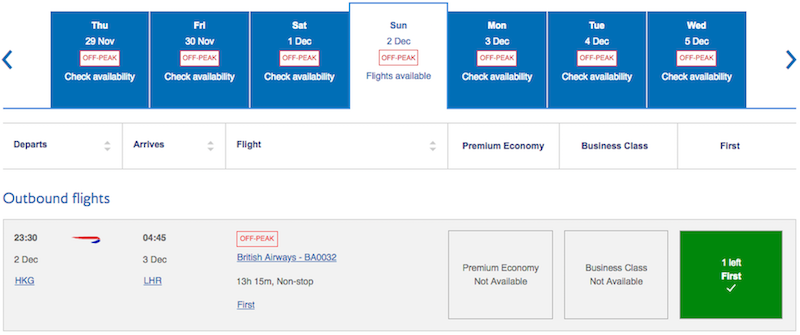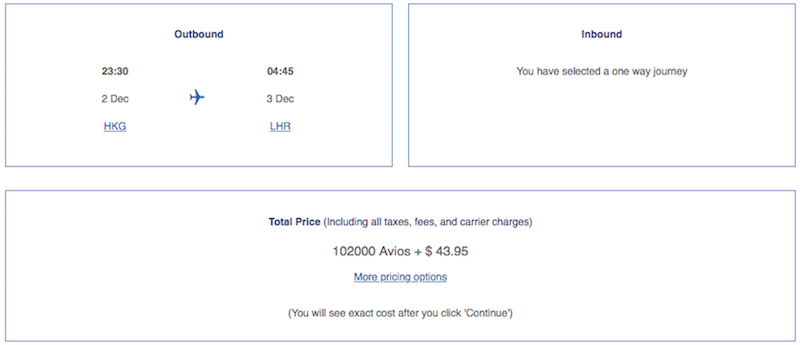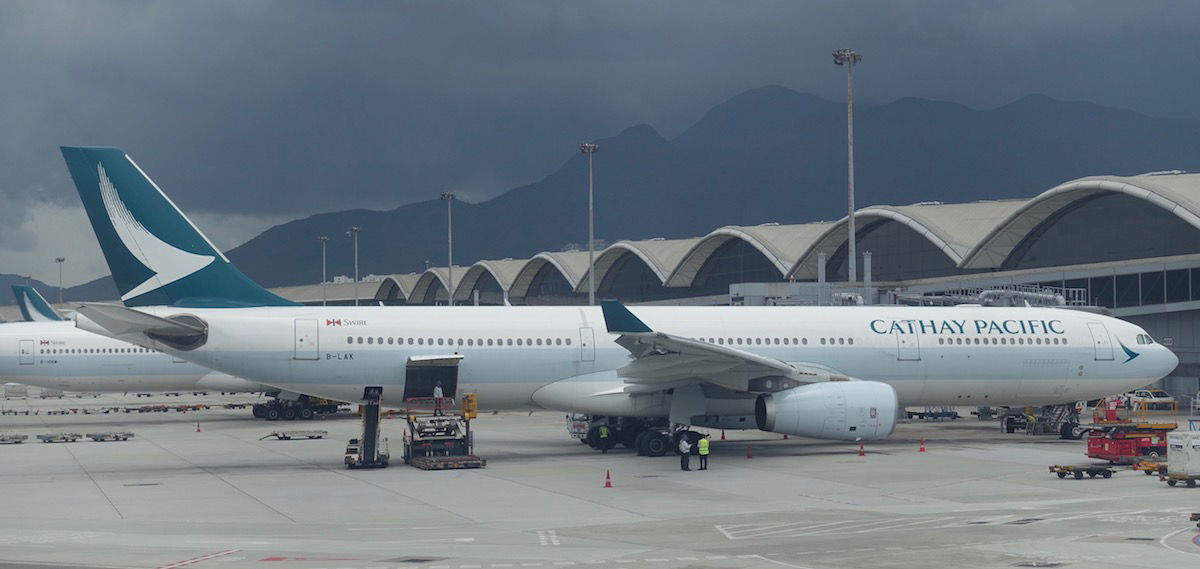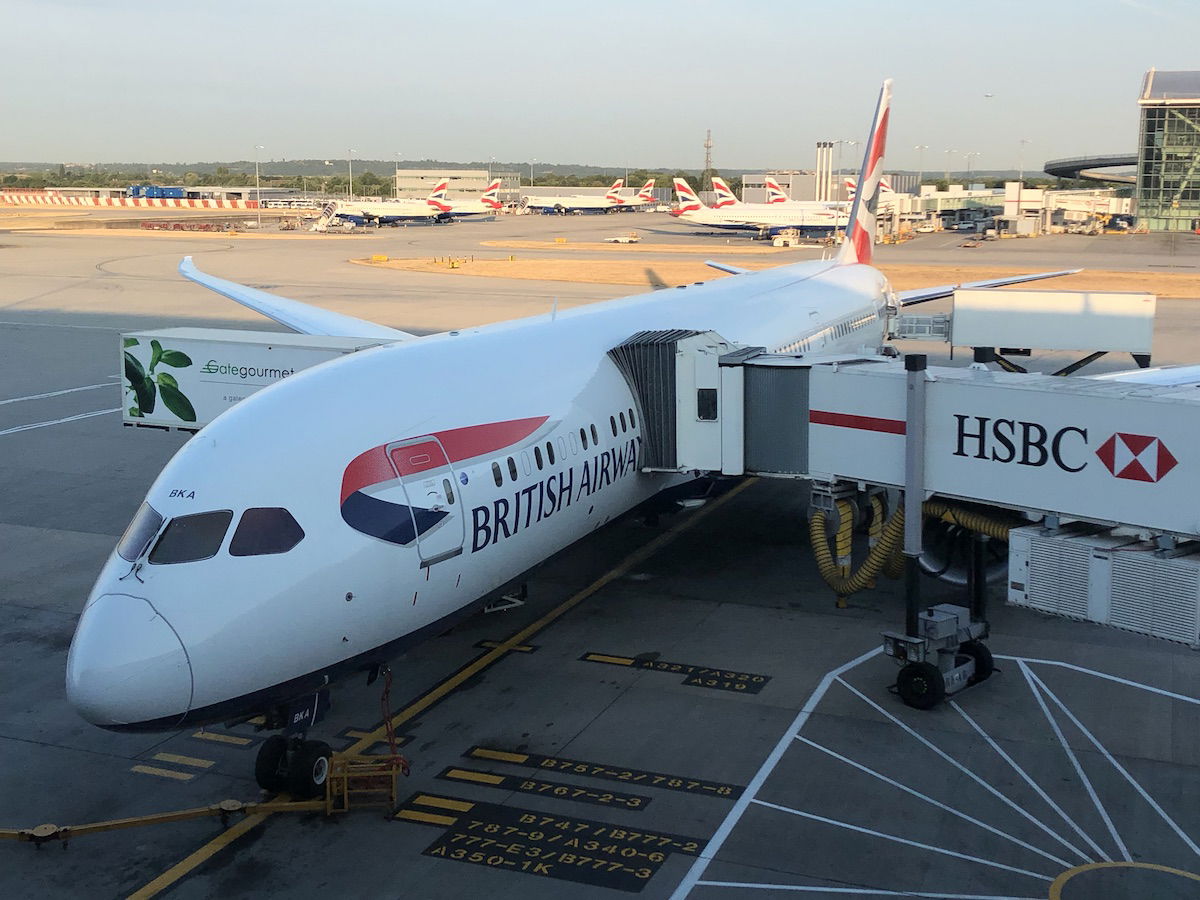Many of you are probably familiar with “fuel surcharges,” which are the pesky fees that many airlines add to their tickets. In reality they don’t have much of an impact on revenue tickets, since airlines are typically required to advertise “all-in” costs, and it’s not like airlines would lower fares if these didn’t exist.
Arguably the biggest impact of these fuel surcharges is that some airlines pass these on to consumers when redeeming miles. In some cases that means your “free” ticket ends up costing $1,000+ in taxes, fees, and surcharges, which sure takes a lot of the fun out of it.
Some countries and regions ban fuel surcharges
Historically some countries and regions have banned airlines from imposing these surcharges. For example, Hong Kong has had a ban of fuel surcharges for a couple of years, which has been great for those redeeming miles.
For example, take the below British Airways award ticket from Hong Kong to London. British Airways first class awards usually come with hundreds of dollars in fees, while in the case of a ticket originating in Hong Kong, you’re just paying minor taxes and fees.


This is of course great for those redeeming miles.
Hong Kong is ending their ban on fuel surcharges
The Civil Aviation Department of Hong Kong has announced some changes to how airlines have to display their prices. As part of this, Hong Kong will be ending their ban on fuel surcharges as of November 1, 2018.
Essentially they’re noting that the ability for airlines to unbundle fares leads to more competition, especially for a place like Hong Kong, which has service from over 120 airlines to over 220 destinations. A spokesperson said the following:
“The further review noted that the global trend of deregulating fuel surcharge to enhance competition, as highlighted in the consultancy study, echoed with the progressive liberalisation policy in Hong Kong’s air services regime. It also noted that the fuel cost was part of the operating costs of airlines that had to be recouped in any case, be it as part of the basic ticket fare or as a separately listed surcharge. Individual airlines should be allowed to make their own commercial decisions on whether to levy a fuel surcharge. The key is to encourage competition and to ensure transparency in price display to facilitate consumers in making informed choices.”

My take on this change
Hong Kong was a great airport out of which to book award tickets given the lack of fuel surcharges departing there. Did I love this rule? Of course I did.
At the same time, do I think it’s the government’s role to regulate this? No. I think what’s important is that the government ensures that airlines are at least marketing this correctly. For example, globally we’ve seen airlines go from referring to these surcharges as “fuel surcharges” to “carrier imposed surcharges,” with the latter being more accurate, and reflecting that these surcharges have little correlation to the cost of fuel.
At the end of the day I think airlines should be able to levy whatever surcharges they want on tickets, as long as they’re transparent about it. If we don’t like it, we can not do business with them.
Again, I don’t like this change. But under Hong Kong’s rules it was okay for an airline to levy a redemption surcharge (like what Qatar Airways has), but not a “carrier imposed surcharge,” which seems like a silly differentiation to make.

Bottom line
Hong Kong lifting their ban on carrier imposed surcharges is obviously bad news for those of us looking to redeem miles. While I hate surcharges and will do what I can to give as much business to programs that don’t levy these, I do think airlines should have the right to (transparently) charge whatever fees they want, and then we can decide for ourselves whether or not the program is worth getting involved with.
What do you make of Hong Kong’s rule change with surcharges?





Lucky says: At the same time, do I think it’s the government’s role to regulate this? No. I think what’s important is that the government ensures that airlines are at least marketing this correctly. For example, globally we’ve seen airlines go from referring to these surcharges as “fuel surcharges” to “carrier imposed surcharges,” with the latter being more accurate, and reflecting that these surcharges have little correlation to the cost of fuel.
Fundamentally, this whole...
Lucky says: At the same time, do I think it’s the government’s role to regulate this? No. I think what’s important is that the government ensures that airlines are at least marketing this correctly. For example, globally we’ve seen airlines go from referring to these surcharges as “fuel surcharges” to “carrier imposed surcharges,” with the latter being more accurate, and reflecting that these surcharges have little correlation to the cost of fuel.
Fundamentally, this whole problem has all to do with how fares are displayed in the CRS. YQ charges were a way around the CRS display (lowest base fare, and then after going through the motions, jumps up to $800) and of course fuel was a convenient excuse to use at the time because fuel prices were high. We have all seen, now (and many predicted back then), that this is the equivalent of crack for airlines and that it isn't going anywhere. So given this abuse, national government should regulate this to at least have some sort of consistency and level the playing field.
@Phil, I almost never use Aeroplan miles for Air Canada flights. I use United miles for air canada flights and Aeroplan miles for united flights.
All countries should immediately ban fuel surcharges!
I guess it's fine for carriers to add stupid "fuel" or "carrier-imposed" to revenue flights. Total cost = total cost; flyers can and should take this total cost into account when booking flights.
But I think it should actually be prohibited for them to do this on award tickets, which are practically (if not fine-text-noted) advertised as free flights. Or, at the very minimum, make airlines include *in legible text* information about such ridiculous surcharges...
I guess it's fine for carriers to add stupid "fuel" or "carrier-imposed" to revenue flights. Total cost = total cost; flyers can and should take this total cost into account when booking flights.
But I think it should actually be prohibited for them to do this on award tickets, which are practically (if not fine-text-noted) advertised as free flights. Or, at the very minimum, make airlines include *in legible text* information about such ridiculous surcharges in any advertisement that mentions miles/points.
"60,000 miles after spending $3,000 with the [foo] credit card! When you pay fuel surcharges of up to $1000, 60K miles is possibly enough for a ticket between the U.S. and Europe! (though availability may be extremely constrained)."
Of course, I also think that "resort fees" should be illegal. I know, transparent, reasonable price disclosure to consumers... crazytalk!
A lot of times, you don't have a choice about which airlines to fly, making avoiding surcharges very difficult. In Canada, for instance, the only real awards program is Aeroplan, and flying to Europe usually means huge surcharges, especially on Air Canada and Lufthansa. Yes, you can fly United, but now you're adding multiple stops and hours of travel to what should be a simple 6 hour flight across the Atlantic. In reality, it's not...
A lot of times, you don't have a choice about which airlines to fly, making avoiding surcharges very difficult. In Canada, for instance, the only real awards program is Aeroplan, and flying to Europe usually means huge surcharges, especially on Air Canada and Lufthansa. Yes, you can fly United, but now you're adding multiple stops and hours of travel to what should be a simple 6 hour flight across the Atlantic. In reality, it's not always that easy to "vote with your wallet," and regulations like these are an important way of keeping consumers from being exploited.
The champagne corks must be popping in the London BA boardroom at this news!
BA have those free-market suckers who believe airlines can charge whatever they want for their product, even if it's a stinking pile of crap, firmly in their sights. Yep, no shrinking violets, ever, regarding fees 'n surcharges, they will continue to screw you until you squeal!
The difference is substantial, eg CX Hong Kong to Australia, taxes of under $10 AUD, QF more than $150 ( J class one way). CX was a sweet spot for redemptions, but likely those days are numbered, if not over.
Lufthansa's intra-Europe economy award tickets often have higher taxes and surcharges than paid ticket price. Yeah, buying a paid ticket is usually cheaper than taxes (not mentioning the cost of miles).
While I agree that ideally businesses should not be controlled by governments, airlines tend to abuse their power and don't play fair with their customers.
So now are there any countries out of which to redeem Avios for BA flights that won't incur fuel surcharges? What are they?
@Eskimo, couldn't agree more. These surcharges/fees are nothing but ways to deceive frequent flyer members and the tax authorities. I personally had an interesting experience with by GarudaMiles where they required me to pay MORE in fuel surcharges and redemption fees (when trying to redeem my miles) than the cash price!!
@Lucky
"I do think airlines should have the right to (transparently) charge whatever fees they want"
Really? Isn't this what we already call ticket price? You want more revenue you set the price higher. You want to avoid giving "free" tickets, you raise the mileage cost.
Think of it this way @Lucky, imagine you flying EK ordering your Dom Perignon then suddenly the flight attendant ask for your credit card to pay 'surcharge' for...
@Lucky
"I do think airlines should have the right to (transparently) charge whatever fees they want"
Really? Isn't this what we already call ticket price? You want more revenue you set the price higher. You want to avoid giving "free" tickets, you raise the mileage cost.
Think of it this way @Lucky, imagine you flying EK ordering your Dom Perignon then suddenly the flight attendant ask for your credit card to pay 'surcharge' for the 'complimentary' champagne. Transparency, yes there is an asterisk saying you must pay for beverage surcharge in the menu.
In the time when consumers have caught up with $1 fare $499 surcharge, these 'surcharges' should be baked into the fare.
As a HKer, I am most definitely not happy with this...
How do you unbundle fuel from air travel though? It’s like unbundling EZpass in states that are EZpass only...You are not going anywhere without fuel. Not like baggage, or IFE, or F&B.
What always amazes me is the fact that tax authorities all over the world continue to turn a blind eye towards this very obvious attempt by airlines to dodge sales/VAT tax by turning fares (which are fully taxable) to almost zero and in turn charging filthy amount of surcharges and/or fees which are largely tax exempt. I just do not understand why tax authorities let this sure revenue stream slip through their fingers?? Looks like...
What always amazes me is the fact that tax authorities all over the world continue to turn a blind eye towards this very obvious attempt by airlines to dodge sales/VAT tax by turning fares (which are fully taxable) to almost zero and in turn charging filthy amount of surcharges and/or fees which are largely tax exempt. I just do not understand why tax authorities let this sure revenue stream slip through their fingers?? Looks like the only way to stop these disgusting surcharges and/or fees are to change the tax codes. Move over aviation authorities, let the taxmen handle these!
All airlines should not be allowed to charge any type of fees. Period.
Isn't this more a topic of fiscal optimization? Do they pay taxes on surcharges?
You think these pigs are going to regulate themselves? The government has to protect the customer.
Interestingly not all flights out of HKG complied with the maximum value the government set on this levy. An example is that the same BA flight award in Lucky's article, if it was booked with IB Plus instead of BAEC had a Euro's 240 levy applied, and this was purely because the booking country is Spain instead of Hong Kong. Seems like airlines that flew out of HKG complied but others did not.
@RF Hong Kong isnt a country, its a part of China.
Very good. Love it.
Finally the peasant masses are getting separated from the truly rich like Endre. Filthy, smelly peasants need to stay at their station in life. If you agree vote for Republicans with me.
HKG-DXB on JAL miles was a good way to experience EK first class, seems not the case now
Damn. I was looking forward to using Emirates miles from Hong Kong for this reason. The 11/1 date looks like it is for all tickets booked after then so need to book by then. Of course, they may 0 out availability knowing the rule is being rescinded.
Now they can charge the fuel surcharge, maybe Cathay will start releasing award seats again.
Cathay has already been adding fuel surcharges on itineraries that don't originate in HKG. Now they can for ex-HKG itineraries as well. For award tickets, it depends on which programs you book through. Asia Miles has been adding charges - say JFK-HKG. AA and Alaska still do not. I booked a bunch of different flights for next year with Alaska and AA and the taxes and fees were all reasonable and less than $100 roundtrip.
So how much will the “surcharges” be on that HKG-LHR ticket (mentioned above)? What if I have a IAD-HKG-CPT (alaska award ticket-CX metal) planned for the future, will this change my taxes? Should I book prior to 11/1 to save money?
So if the intent is to unbundle the fare, are they expecting CX or BA to sell seats for flights from HKG to LHR not requiring fuel?
Noo! I think HK (and other countries) should ban all "fuel surcharges."